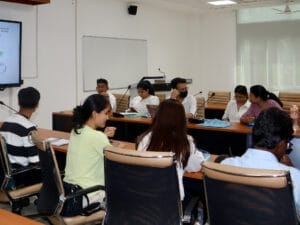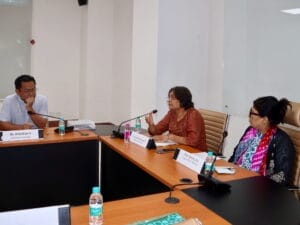Workshop Report
Two-Day Capacity Building Workshop for Ph.D Students

Organised by:
Savitribai Phule Pune University (SPPU)
in association with
Association for Asian Studies (AAS)
Sponsored by
Swedish International Development Cooperation Agency (SIDA)

Date: April 21st – 22nd, 2025
Venue: H-205, Committee Room, Department of HSS
This was a two-day capacity-building workshop for Ph.D. students, organized in collaboration with the Department of Humanities and Social Sciences, IIT Roorkee, and Savitribai Phule Pune University (SPPU) in association with the Association of Asian Studies (AAS) and supported by the Swedish International Development Cooperation Agency (SIDA).
A total of 16 participants affiliated with different state and central universities from Central India, Eastern India, Northeast India, South India, and North India attended the workshop. In alignment with the workshop’s objective, the workshop focuses on building the research capacities of the participants. We have four sessions, which revolve around conceptualizing the field, doing fieldwork, researching ethics, and engaging with the idea of ‘community’.

First Day
The workshop began with an inaugural session, where speakers highlighted the motive and objective behind the workshop. The inaugural session laid the foundation for the sessions or the workshop in general. Prof. Deshpande and Prof. Tamde shed light on the larger idea of CHSS and the nature of activities conducted under the project. The workshop at Roorkee is the 10th Edition.
The technical sessions began with sessions by Prof. Madhura Lohokar. Prof. Lohokare’s sessions focus on issues pertaining to the field, from conceptualizing the ‘field’ to writing fieldnotes and linking data with theory. The session locates the idea of the field, tracing its genealogy from the time of colonialism and its conception by early anthropologists. Prof. Lohokare’s notes how the field is not ‘given’ or out there as has been commonly perceived, but rather, a more relevant and better way of understanding is to approach the field as a process, as relational, and a product of research’s questions. Prof. Lohokare’s session provides deep engagement and insights into how the ‘field’ is always in the making, between the research and the research participants.
Following this, Prof. Lohokare focuses on the practical aspects, i.e., writing fieldnotes and linking data with theory. These sessions were activity-oriented, where participants were handed out texts to analyze and read. In field notes, she looks at various ways in which researchers can take field notes, which is primarily about documenting or providing a thick description of researcher experience in the field. This can cover documenting the time of the day, space, sense, and emotions, among others, based on the context of the field. The final session was reading a text together where participants were engaged in engaging with how scholars used their field notes, observation, and made arguments, or linked them with concepts and frameworks.
Dr. Roluahpuia took the last session on Doing Fieldwork in Perilous Sites. The lecture is based on the speaker’s experience and encounters with fieldwork in northeastern India. The session covers some ethical and moral challenges, research dilemmas that researchers working in sensitive or conflict-affected fields face, and the risks and dangers that scholars are exposed to. Dr. Puia notes how discussions on perilous sites are rarely, or at times hardly, discussed in mainstream institutions, despite a vast region in India that is perilous for scholars, particularly Central India and Northeast India. The field as such is not the same for everyone, and the experience varies where scholars are faced with the question of ‘taking sides’ to be forced to flee from the field, while at times, their identity as researchers is downplayed if they are ‘insiders’.




Day Two
The second day started with sessions by Prof. Virginius Xaxa. Prof. Xaxa’s session primarily focuses on the question of the category ‘community’. The idea of the community has been central to social science discourse, as is evident from the work of Ferdinand Tonnies, Emile Durkheim, among others. Prof. Xaxa situates this long genealogy of how the idea of the community has been conceptualized, refined, and revised. In the case of India, several scholars have tried to unpack this by looking at the question of community, as is evident in the scholarship on village studies, which was predominant in the 1950s and 1960s. Today, the understanding of the community has shifted significantly, and new concepts such as civil society and political society, among others, are conceptualized and circulated.
Despite this differential understanding, Prof. Xaxa notes that the idea of community is contested, and definitions or attempts to define remain problematic, if not challenging. At the same time, he advocates linking community studies to various aspects such as development, exclusion, and the state. He deeply engages with how different institutions have refashioned and affected the idea of ‘community’.
The last session was by Prof. Anagha Tamde. Prof. Tamde focuses on research ethics, an important subject often ignored in larger research practices in India. Prof. Tamde advances pertinent issues about being ethical or research ethics based on her experience. Two key points that her lecture focused on were understanding ethics as every day or what she calls everyday ethics, and how ethics is also linked to living or being an ethical human. Ethics are key to any research endeavor, and the session by Prof. Tamde shed light on the various ways in which ethics needs to be understood, approached, and taken into consideration while conducting research.
In closing the workshop, Prof. Deshpande summarized the workshop by highlighting some of the key takeaways and learnings. In this, Prof. Deshpande also highlighted the various activities and future possible collaborations between participants and AAS in the form of grants or participating in future workshops.




